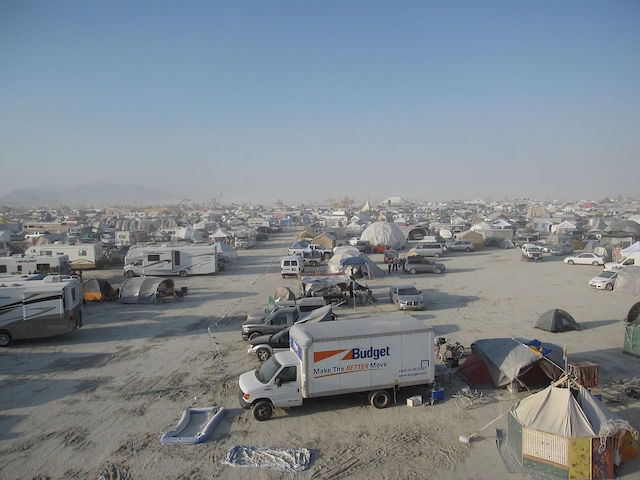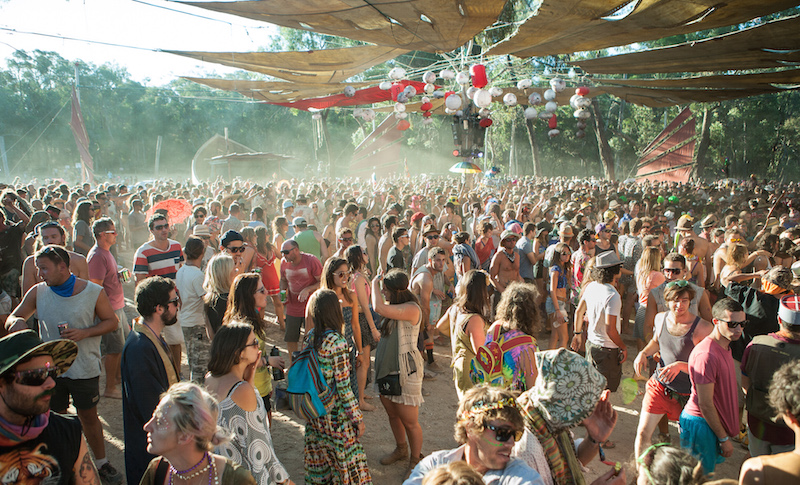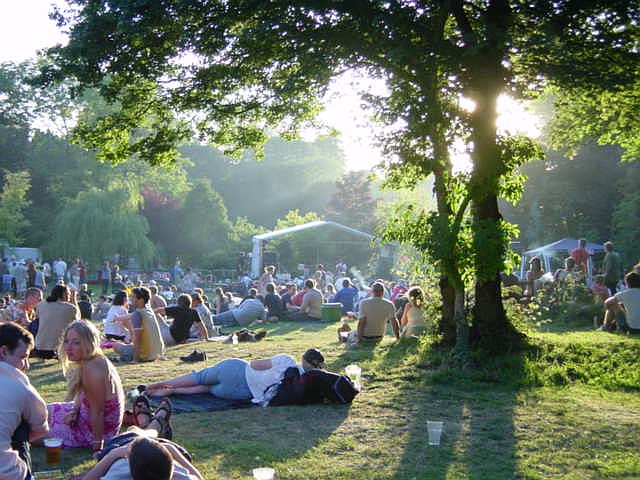Can you cut 1 Tonne of carbon pollution out of your life?
Take the challengeFestival season is looming, and the party people of Australia are warming up to a summer of outdoor dance events and musical gatherings under the stars.
We just want to know if festival fun comes at a price.
Fun requires energy. Think about it. How much energy is needed to generate a good music festival? There's the transport vehicles, the stage set ups, the light set ups, the water tanks, the food and drink tents, the lighting towers… The list is endless, and often sustainability is not the priority for music festivals - even the seemingly sustainable ones.
A recent study has shown that Burning Man - a festival that has for years prided itself on 'leaving no trace' - actually leaves quite a big trace.
A trace of CO2. The findings show that in 2006, Burning Man generated 27,000 tonnes of greenhouse gas emissions. This included the transport of guests to and from the event, on-site power generation, art cars and installations. We're no expert, but it's 2015 and with more technologies and more people attending festivals, the CO2 emissions at festivals must certainly be peaking.

To break it down
We can place the environmental impacts of music festivals into four categories:
CO2 emissions - These are from transport to and from the festival (keeping in mind that some people travel internationally for some music events and must fly) and power usage at the festival.
Waste generation -This includes food scraps, rubbish, sewerage and grey water.
Consumption of non-renewable sources - Fuel is the big one.
Possible damage to the festival site - Damage to the natural state of the land from the festival-goers, as well as damage from traffic.
A number of music festivals in Australia have acknowledged that these factors are hurdles in the climb to sustainable partying. We can reduce our carbon footprint by checking just how sustainable music festivals really are. A bit of research, and a bit of preparation can go a long way.
Choosing sustainable festivals
Go onto festival websites and see what sustainability strategies they have implemented (if they have any at all). Email them and ask them questions about what kinds of methods they use – A lot of festivals even take volunteers to help the clean up and this sometimes means a free ticket!
While you're at the festival you can also evaluate its sustainability.
Take a look at the facilities. The toilets. Is there a compost system in place? A lot of festivals have started to put buckets of mulch with a spade in toilet stalls. The idea is when you've done your business; you cover it with mulch to be used as post-festival-compost.
Take a look around the site. How many bins are around? There should be an ample amount, all with recycling labels on them.
How many food and beverage tents are on site? Festivals that ask you to bring all of your own food and water are also good to look out for, though there are few festivals like this. The less food tents there are the less large amount of waste there will be. If there are food tents take a look at the food packaging available – is it biodegradable, or plastic? Ask them.
In recent years there has been an increased interest in event sustainability. In 2012 the International Standard for Sustainable Management was created, which provides a systematic basis on how to produce more sustainable events.
New technology has also been developed so that festival organisers can keep track of databases to maintain festival sustainability. There are now apps and tools such as Carbon calculator, which helps to calculate the carbon emissions certain resources will create, and help to eliminate anything excessive.

How to reduce your festival footprint
So you've found yourself a festival that is sustainable (or maybe it's not sustainable but you want to go to it anyway). Now it's time to make sure that you are sustainable while you're there.
1. Pack all of your own food
Take a day (or two) off before the festival to cook and prepare food. Get a group together, find a kitchen, and whip up all of your favourite meals – ones that will keep for a few days. Give these a whirl. Whatever food you bring should have little or no packaging. Pack the food away in Tupperware (nothing disposable plastic), and pack it into your cooler. If you're a sucker for fresh food, try these tips. Also, make sure you and your camper friends bring your own cutlery, bowls and plates - (no disposable cups or forks), and take it in turns to wash as you go.
2. Car Pool
Driving a car to a festival is a big carbon emitter. There are few ways around it, unless you happen to live around the corner from the festival and can walk or cycle. Since you're probably not that lucky too often, the best alternative is to pack as little as possible and car pool. Squishing five people in one car instead of three in one car and two in another might not be the comfiest ride… but the planet will thank you.
3. Resist buying Festival paraphernalia
This one can be surprisingly difficult especially if you want to buy festival food. Sometimes even if you've pre-cooked a delicious meal, the smell coming out of the Mexican food tent is too good to resist. If hot food is what you're really craving, then you can always cook simple hot dishes at the festival over a small fire, e.g. roasting potatoes and veggies wrapped in foil. If there's festival merchandise on sale resist buying that too if it's wrapped in plastic packaging. Or if you do end up buying a trinket, always politely refuse to take it away in a plastic bag.
4. Clean up after yourselves
Even if you're being careful about your waste, at a festival it's inevitable that you'll make a bit of a mess. Once you've packed up your campsite, go back over your area and check that there is no rubbish left – especially plastic. Heck, why not go around and look at the other sites too? If people see you picking up rubbish, other campers might feel inspired to do the same.

The festival season is coming. The fun does come at a price.
But as long as we're conscious of the sustainable methods in place at the festivals we attend, and properly manage our own waste, there's no reason we can't all still have a good time.


